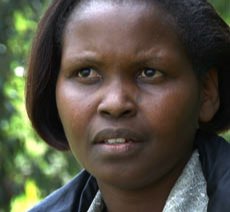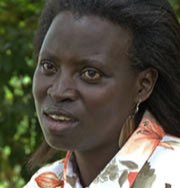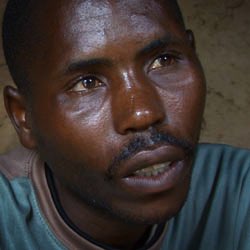Encounters with conflict and peace
Where does it hurt?
Rwandans often describe the process of recovery as a journey; some of their recovery education programs are known as ‘personal development' workshops.

Janvier, who was a young boy when he saw his sister brutally killed, says that talking with friends helps him sort out his memories. ”We will never forget a single scrap of truth about the genocide… we share our memories, we talk about it in the evenings and go over the details with one another. We are not interested in making things up any more, or exaggerating or hiding things… we are no longer muddled by the fear of machetes.”
We’re all hurting
Talking about what happened can be good for other people too. “Sometimes the stories they tell will help someone else to heal,” says Alphonsine. A young Rwandan girl from the Bugesera denies she has been hurt, even though her arms have large visible scars. It’s not until she hears another girl talking about an attack that she dares to tell anyone about her own experience and the painful reason why she did not die: they kept her alive to sexually assault her.
Hearing someone else’s story helped her realise that the same thing had happened to other people. She was not alone - someone else understood.

"When you lose someone, it's like you have made a mistake. You are ashamed. Being a survivor or an orphan or a widow… these weren’t things we could accept easily. People just lost interest in life. Women who had lost their husbands or their children would say, 'Why have I survived? Am I better than my children?' They would blame themselves for being alive.”
“It was a very bad for the people in the refugee camps. Cholera, looting… you could see they had suffered. I remember seeing people who had walked back from Congo. They came back with no shoes, swollen feet… and some of these were people with PhDs.” Josephine
Surgery for the mind damage

But these are not things most people want to talk about. Why should you have to deal with it? After all, you’re the victim. It’s everyone and everything else that’s the problem. You feel it’s really unfair to ask you to do anything to help your own situation. You don’t want to talk about it - you don’t even want to think about it.
“People are carrying some terrible issues,” said Josephine. “Pain destroys your feelings, it destroys your thinking. You feel broken, you feel like you are not OK.”

Josephine believes that, despite the pain, realising that you have been badly hurt and that you, too, need some fixing is an important step towards recovery. “You have to have sympathy for yourself,” she says. “It’s a long process… but it’s the start of a new journey,”
However, once you’re aware of how much you’ve been hurt, what do you do with that? What can you do to stop yourself from being swamped by the memories and the feelings? How can you find a little mental space - a little peace of mind - to let you start picking up the pieces of your life again?
Related pages
genocide

Ntarama church
GENOCIDE STORIESAs trouble escalated, terrified Tutsis gathered in the Catholic church in Ntarama. When the militia attacked and killed 5,000 people, Janvier said, "I just lay there and made 'dead man's eyes'... more
aftermath

Going home
AFTERMATH STORIESWithin a few days Janvier, aged 14, and his brother, simply went back home. They found they house destroyed, so walked on to their grandfather's house, to find that he had also been killed... more
genocide

A day in the marshes
GENOCIDE STORIESJanvier was one of thousands of people who hid from the gangs of killers among the papyrus and mud of the marshes around the Nyabarongo River. Survivors and killers remember what it was like... more
< previous page | next page >
In this section
AN EXPERIMENT IN RECOVERY
Back from the edge
Experiment in recovery
A new Rwanda
JUSTICE
An overloaded system
The importance of justice
Teaching gacaca
Confronting the past
Soft justice?
Has gacaca delivered justice?
PEOPLE WHO KILLED
Helping killers
Sorry
MIND DAMAGE
Recovering from genocide
Living with the pain
Obstacles
Where does it hurt?
BUILDING PEACE
Breaking the cycle
Building peace

Back from the edge
Experiment in recovery
A new Rwanda
JUSTICE
An overloaded system
The importance of justice
Teaching gacaca
Confronting the past
Soft justice?
Has gacaca delivered justice?
PEOPLE WHO KILLED
Helping killers
Sorry
MIND DAMAGE
Recovering from genocide
Living with the pain
Obstacles
Where does it hurt?
BUILDING PEACE
Breaking the cycle
Building peace

